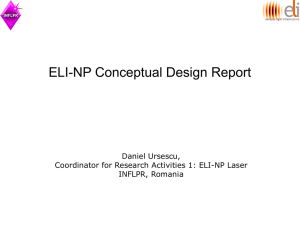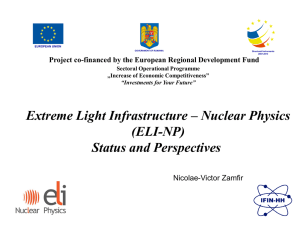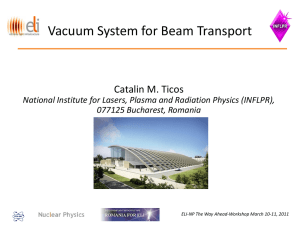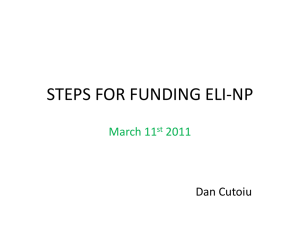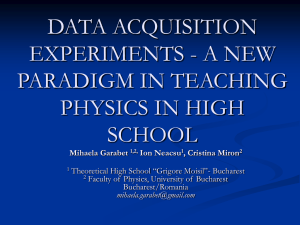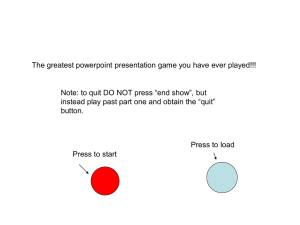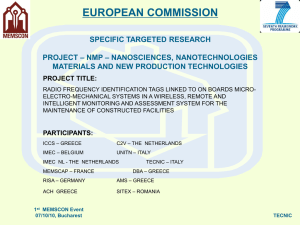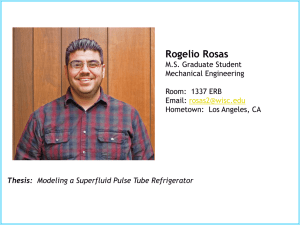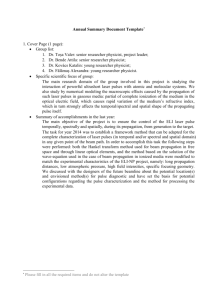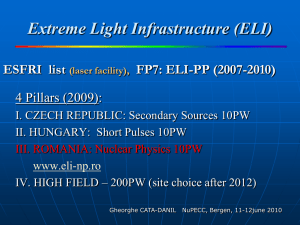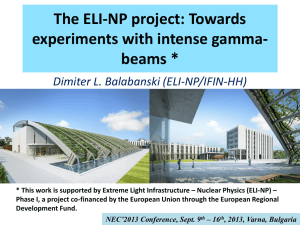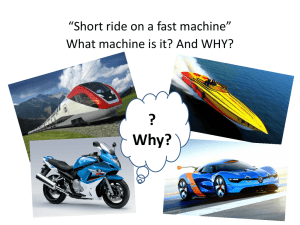About the possibility to build a 10-PW laser for ELI
advertisement
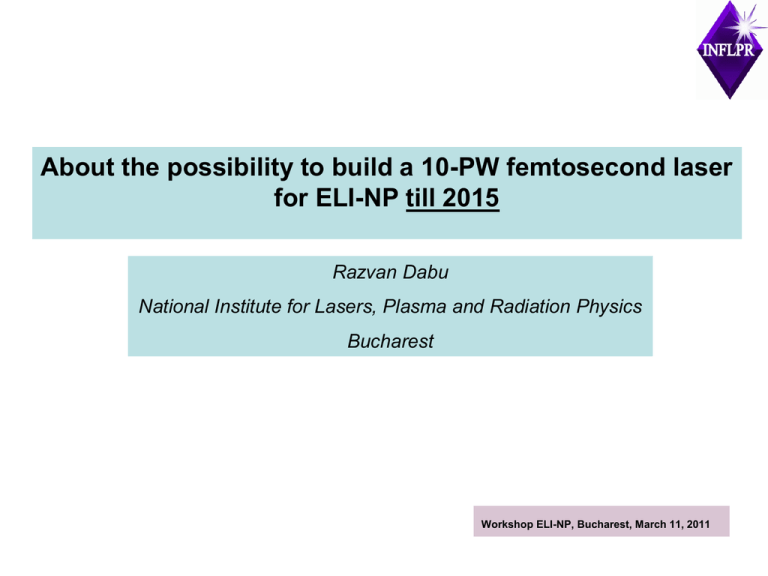
About the possibility to build a 10-PW femtosecond laser for ELI-NP till 2015 Razvan Dabu National Institute for Lasers, Plasma and Radiation Physics Bucharest Workshop ELI-NP, Bucharest, March 11, 2011 Possible solutions for a 10-PW femtosecond laser system A. Basic solution: High energy CPA in Ti:sapphire crystals. B. Back-up solution: CPA in mixed Nd doped glasses (silicate & phosphate glasses) At present, both solutions involve technical difficulties and bottlenecks Workshop ELI-NP, Bucharest, March 11, 2011 Solution A – bottlenecks and technical difficulties: 1. Large size Ti:sapphire crystals. 2. Large size, high damage threshold compression gratings. 3. Broad bandwidth high damage threshold high reflection dielectric coatings. 4. Optically synchronized Front-End including high energy and high repetition rate Yb:YAG pump lasers for OPCPA. 5. High repetition rate pump lasers for power amplifiers (including technical solutions, large size LBO crystals for SHG, beam homogenizers). 6. Large size adaptive optics. Workshop ELI-NP, Bucharest, March 11, 2011 Solution B – bottlenecks and technical difficulties: 1. High energy short pulse amplification with sufficient bandwidth to generate pulses of ~ 100 fs pulse duration. 2. Pulse compression of high energy (>1 kJ) pulses (tiled system with high damage threshold multilayer dielectric gratings). 3. High intensity contrast (> 10^12) of the focused beams. 4. Thermal management of Nd:glass media for good repetition rate (1 pulse/min – 1 pulse/10 sec). 5. Large size mirrors. 6. Large size adaptive optics. Workshop ELI-NP, Bucharest, March 11, 2011 Risk evaluation If we consider an optimistic probability of 80% for each of these 6 problems to be resolved in the next 2-3 years, the probability to overcome the whole system bottlenecks and technical difficulties is 26% until 2014. For 90% → 53% Moreover, there is an engineering question: it is possible to accomplish the laser system development in the remaining time till the end of 2015? It seems unlikely. Workshop ELI-NP, Bucharest, March 11, 2011 Project implementation – version I I. There is an entity (Company, Research Institute, International Consortium, etc.) able to assume the risk to build till 2015 a laser system with the following specifications? Peak power ≥ 10 PW Central wavelength: in the range 700-1100 nm Pulse duration: < 150 fs Repetition rate: higher than 1 pulse/min (higher than 1 pulse/10 s?) Intensity contrast ≥ 10^12 Strehl ratio ≥ 0.6 Peak intensity of the focused beam ≥ 10^23 W/cm2. Delivery time ≤ 48 months under contract terms including: - milestones; - deliverables; - acceptance tests; - guarantee, penalties, repayment guarantee, etc. Workshop ELI-NP, Bucharest, March 11, 2011 Project implementation – version II II. Two-stage project implementation (in the frame of an International Consortium managed by a Company with experience in femtosecond laser systems manufacturing?): First stage: contract for a 2- 4 PW (?) laser system development, based on already existing techniques at T0 (project start moment), with the deadline on the end of 2013 - middle of 2014 year. Second stage: In the meantime (till 2014) and after 2014, R&D to build a multi-PW laser with the target to reach 10 PW in 2015 or later. Workshop ELI-NP, Bucharest, March 11, 2011 CONCLUSIONS 1. Without delay: discussions with the potential producers to find out if there is some entity able to assume the risk of building a 10-PW laser system under a contract based on well established conditions. 2. In case of a negative answer, to apply the two-stage project implementation. Workshop ELI-NP, Bucharest, March 11, 2011
